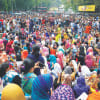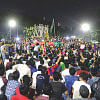Job Quota Reform: Long call falls on deaf ears
The call for reforming the quota system for government jobs was voiced just a year after it was introduced in 1972 and since then, several public service reform committees and the Public Service Commission itself, the body that oversees government recruitment, have objected to the policy.
However, documents show subsequent governments paid no heed to the suggestions for making room for more efficient people in bureaucracy by reforming the quota structure, leading to today's anger among the youths in the midst of a slowing job market.
All these recommendations had strong arguments evidenced by statistics that while some positive discrimination is required for the disadvantaged groups, other provisions simply discourage meritocracy.
When Bangabandhu Sheikh Mujibur Rahman introduced quota in September 1972, the reality was quite different with a country ravaged by war and suffering from long deprivation and extreme poverty. The Pakistani rule had discriminated against the Bangalees, and the districts other than Dhaka even more suffered from a lack of education and opportunities.
So, Bangabandhu had introduced a quota system that allocated 40 percent of the jobs to districts, 30 percent to freedom fighters who had lost nine months of their educational life fighting for the country, and 10 percent for the war-affected women. The rest 20 percent were to be appointed on merit.
In 1972, two high-powered reform bodies were assigned to make suggestions for the civil bureaucracy. It recommended next year several measures for selection process based on merit and long-term career planning.
In 1976, the Pay and Service Commission was formed and that also recommended merit-based recruitment. Meanwhile, the government increased merit quota to 40 percent from 20 percent and district quota was halved to 20 percent.
Talking to this newspaper recently, former caretaker govt adviser Akbar Ali Khan said that in 1977, almost all members of the then Pay and Service Commission expressed their opposition to enforcing any type of quota for recruiting government officers.
From 1982 to 1984, two major reform bodies were appointed -- one a martial law committee and the other a civilian one.
Later in 1985, during the martial law rule of HM Ershad, the quota for the war-affected women was discontinued as no job seekers were found and this quota was given for women candidates as a major step to promote women empowerment. Ershad, for the first time, also introduced a 5 percent quota for the ethnic minorities.
In December 1996, after the Awami League government came to power, the Public Administration Reform Commission was set up as the first major attempt to modernise the bureaucracy.
The commission observed that the quota system on the face of it is unconstitutional and proposed a constitutionally supportive recruitment policy is followed.
The commission had recommended an increase in the merit quota to 55 percent from 45 percent.
The quota for freedom fighters was a problem area from the beginning because the required number of candidates was not found as an analysis of this category from 1982 to 1990 shows.
In 1982, seven percent of the quota was fulfilled against 30 percent allocation. This dipped continuously except in 1984 and in 1990 only one percent was fulfilled.
The posts against the unfulfilled quota remain vacant and the commission fulfils the empty posts with candidates from the next examination. In the context of such unfulfilled posts, the PSC recommended an increase in merit and women quotas.
“This request continued since 1987, but for ten years the government remains silent on the issue,” AMM Shawkat Ali, a former bureaucrat and adviser to a caretaker government, wrote in his book “Bangladesh Civil Service: a political-administrative perspective”.
“During this period of ten years, committees constituted by the government and other studies sponsored by the government also recommended reduction of quota for freedom fighters.”
However, instead of reforming this quota, the government in 1997 extended the freedom fighters' quota to include their descendants, making things even more complicated.
Another big drawback of the current quota system is that it leads to misuse of the system, defeating the purpose of helping those from backward communities.
Experts say those who already enjoyed quota privileges should not be eligible for that again. Their descendants also should not have it either, because a person who benefitted from this system should already have established his or her family and children.
Former PSC chairman Sadat Hossain says, “The quota is a special provision for under-privileged populations, and it's an exception. It can't be more than the merit provision.”
As the PSC chair, Sadat had initiated a reform move, and also former cabinet secretary Akbar Ali Khan and former chief election commissioner Kazi Rakibuddin Ahmed carried out a study in March 2008.
They found out existence of 257 types of quotas for all government jobs and recommended a reduction in the quota to 20 percent.
But nothing has been done to do away with the anomalies and to modernise the quota system.

 For all latest news, follow The Daily Star's Google News channel.
For all latest news, follow The Daily Star's Google News channel. 








Comments